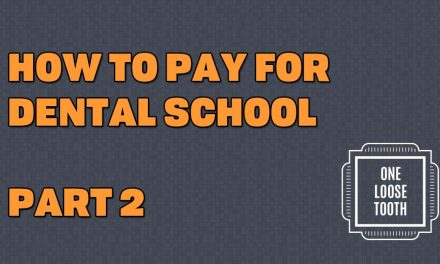It is hard to believe that twelve months ago I had just graduated from dental school and was preparing to move back from Maryland to California. The first year out of dental school presented many challenges – some expected and some unexpected.
As the Class of 2016 begins their professional careers, here is my advice.
- If you have a family member in the profession, lean on them for guidance and possibly early employment (even if that position is part-time). While few of us dream of working for our parents, aunts, or uncles, the sooner you can find stable employment, the sooner you can begin investing in yourself. Working for someone who truly has your best interests in mind will provide both the financial resources and the time-off required to take the CE courses necessary to build your skills.
- Your employer is not a mentor. Many of us hope to work for a doctor who will provide some sort of mentorship however this is rarely the case. Most doctors will employ an associate for one reason – to increase profits.
- Purchase your own malpractice insurance. Some employers offer malpractice coverage and some request that you provide your own. At the beginning of your career, malpractice insurance is affordable so you should carry your own policy even if your employer provides one on your behalf. The AGD offers a free occurrence policy through Dentist’s Advantage to AGD members who just graduated. This policy provides 1 million dollars in coverage per claim with a 3 million dollar annual limit. If you practice in California and are a member of the ADA and CDA, TDIC provides a 1M/3M claims made policy for just $50 for dentists in their first year of practice. Occurrence policies do not require tail coverage and the annual premium will eventually be more expensive than a claims made policy however claims made policies require the purchase of tail coverage if you decide to not renew your coverage.
- Finding the time and the money to take continuing education is difficult because high quality, hands-on continuing education is expensive and your employer may not be willing to give you time off work. With that said, a 12 month residency program that provides experiences in implant placement, periodontal surgery, and molar endo can save you money in the long run. If you are lucky enough to be accepted into a program that prepares you to provide IV sedation, even better.
- Always have an attorney review a contract before you sign it. Contract review will cost you about $350-$1500 depending on the length of the contract, the negotiation, and associated revisions. It’s much cheaper to pay a qualified attorney to review the paperwork before you sign than to pay an attorney to undo the mess you may find yourself in when you need out of a bad contract or employment situation.
- You need to keep your own best interests in mind. Most potential employers seem to be decent (enough) people during the interview process but never forget why you are being interviewed – the practice needs a dentist to increase revenue. You won’t know if the potential employer is a good fit until after you start. Remember, if it sounds too good to be true, it is. (Re-read number 5).
- Â It’s your license.
While looking for employment, new dentists may find these articles helpful:
How to get a job after dental school – a recent graduate’s perspective
How to get a job after dental school with Dr. Greg Winter
Contracts and compensation for new dentists




Tip #4 should be tip #1. The vast majority of gp’s graduating now never progress to the level of someone with a solid residency training. They also produce less and have more liability.